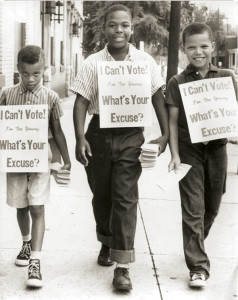 The movie Selma with its vivid celebration of human courage and dignity, creates poignant and powerful imagery affirming the reason we conmemorate Dr. Martin Luther King, Jr. How gut-wrenching it was then, to see Dr. King’s holiday marred with a press release by Rhode Island Senator Leonidas Raptakis announcing proposed legislation to charge peaceful protestors, like those who marched along the Edmund Pettus Bridge, with felonies.
The movie Selma with its vivid celebration of human courage and dignity, creates poignant and powerful imagery affirming the reason we conmemorate Dr. Martin Luther King, Jr. How gut-wrenching it was then, to see Dr. King’s holiday marred with a press release by Rhode Island Senator Leonidas Raptakis announcing proposed legislation to charge peaceful protestors, like those who marched along the Edmund Pettus Bridge, with felonies.
Anyone who has watched Henry Hampton’s Eyes on the Prize series, read books like J.L. Chestnut’s Black in Selma, or simply listened to their parents or grandparents tell it, knows that as powerful as the movie Selma was, it only depicts a small slice of the massive grassroots organizing work that went on in Alabama and throughout the Blackbelt. People met, planned, strategized, and analyzed. And people marched. 600 people marched on Bloody Sunday, and at least 25,000 in the final leg into Montgomery on March 24, 1965. Route 80 was merely the terrain in a people’s struggle for justice.
Fifty years later the marching continues so that Black lives will be treated as more than disposable by the system of policing in this country. While being stuck in traffic is a pain, how much greater is the pain of losing a loved one to police violence, and then seeing no repercussions whatsoever for his killer?
 Senator Raptakis and other critics of protests that include blocking highways have suddenly become fervent advocates for smooth travel by emergency vehicles. Where is their concern when emergency vehicles are slowed to a crawl during sporting events, construction, or Waterfire? The response of this new cadre of traffic safety advocates is something to the effect of, “Yes, but people going to sporting events or boat shows aren’t blocking traffic on purpose,” as if thinking only of fun and games is somehow morally superior than using desperate means to draw attention to unchecked police racism and violence.
Senator Raptakis and other critics of protests that include blocking highways have suddenly become fervent advocates for smooth travel by emergency vehicles. Where is their concern when emergency vehicles are slowed to a crawl during sporting events, construction, or Waterfire? The response of this new cadre of traffic safety advocates is something to the effect of, “Yes, but people going to sporting events or boat shows aren’t blocking traffic on purpose,” as if thinking only of fun and games is somehow morally superior than using desperate means to draw attention to unchecked police racism and violence.
However in a string of cases dating back through the Civil Rights movement of the 1960’s, courts, even those in the Deep South, made it clear that “from time time out of mind … [s]uch use of the streets and public places has … been a part of the privileges, immunities, rights, and liberties of citizens.” In 1965, the U.S. District Court for the Northern District of Alabama addressed the issue of whether people could march along U.S. Highway 80 from Selma to Montgomery. Williams v.
Wallace, 240 F. Supp. 100 (N.D. AL 1965). Hardly a liberal institution, the court held, “it seems basic to our constitutional principles that the extent of the right to assemble, demonstrate and march peaceably along the highways and streets in an orderly manner should be commensurate with the enormity of the wrongs that are being protested and petitioned against.”
The rights protected in these court decisions belong to everyone; consider that disruptive, intentional protest up to and including blocking entrance ramps to Route 95 was part of a mainly white, middle class protest by Credit Union depositors in 1991, as recently reported by The Coalition talk
Fifty years after Bloody Sunday, people still march and sometimes block highways or shut down malls and train stations because Black lives do matter. And as Dr. King said, “Our lives begin to end the day we become silent about things that matter.” Yet Senator Raptakis would have us charged with felonies and jailed for up to five years for something that even courts in the segregated south in 1965 recognized as a fundamental constitutional right.
We hope he has a chance to see Selma.
This op/ed was co-signed by:
- Shannah Kurland, Member, National Lawyers Guild, Rhode Island Chapter
- Fred Ordoñez, Executive Director, Direct Action for Rights and Equality
- Sarath Suong, Executive Director, Providence Youth Student Movement


